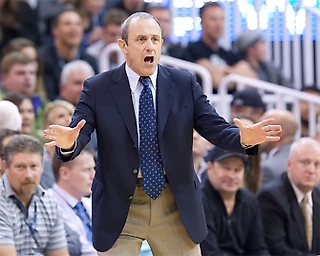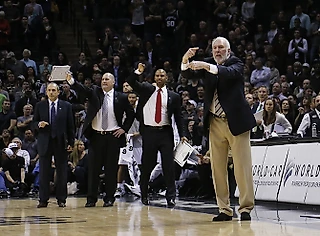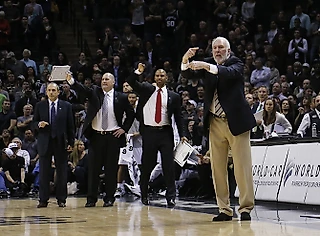Offense or defense? No need to choose one
I came up with the topic for this entry after I read an article by Dan Peterson, an American who’s been living in Italy for more than 30 years and a former coach of Olimpia Milano and Virtus Bologna. He wrote about Mike D’Antoni, his adventure as the head coach of the Lakers and the fact that throughout his career he’s been labeled an “offensive” coach as opposed to many others who are considered “defensive”.
Coach Peterson’s point was that many great coaches who used to coach in the USA both at college and professional levels – like Pete Newell and John Wooden – considered balance to be the most important thing, meaning you cannot base your game solely on offence, just like you can’t base it on defense.
That got me thinking about what we went through with CSKA over the first two months of the season, where it really took us some time both to improve the offense and to establish a more consistent defense. Looking from the outside, it obviously seemed that the players were thinking too much instead of following their instincts on the court.
It came to my mind that back in eighties and the nineties, in the era of a 30-second shot clock, defense was truly the most important factor for the outcome of a game. At that time a lot of people, myself included, assumed that it was on the defensive end where teams built the sense of togetherness and willingness to sacrifice. We believed that doing great on defense in turn gave us more possessions and the opportunity to get easy baskets and play more relaxed offensively, knowing that even if we turned that ball over or took a bad shot, we could always fall back on our solid D, make stops and erase those offensive mishaps altogether.
But this is just one side of the medal. And over the recent years, I’d say, there’s been a shift in how people look at building a team – not only in basketball, but also in other types of activities. The way I look at it now, in order to play good defense you first of all need to trust people around you, knowing that if you make a step away to help a teammate, someone will look after your man until you rotate back to him. You also need to be mentally open to the possibility that your man may score a basket, and still you won’t be guilty of anything because you were doing the right thing helping a teammate.
Probably – and I’m close to saying “surely” here – this trust and readiness to sacrifice can be developed and strengthened on offence, under condition that your team shares the ball and you actually see your teammates doing something together with you. Nothing increases the level of trust like seeing a teammate pass up a shooting opportunity when you’re in a better position, or create an angle that allows you to safely pass the ball from under the double team instead of turning it over, or set a staggering screen for you to get open and receive the ball.
So, in modern basketball trust that’s necessary for good defense actually comes from enjoying the game on the offensive end together. That point is further proved by the amount of frustration you see every time a player puts his head down and tries to force things in one-on-one situations, or takes a contested shot rather than feed a wide-open teammate. All that breaks the desire to play together, cover for each other and sacrifice for the sake of the team, essentially depriving you of things that are vital for good defense.
That’s what happened for us in the Barcelona game. It was frustrating to lose, of course, but it stung even worse to realize that after we missed 4 or 5 shots and forced a couple of possessions, it affected our defense a lot. We became a step slower in help situations and stopped trusting each other. Our players seemed afraid of being let down on defense just like it was happening on the other end. Everybody felt down and alone. Hopefully, it was a good lesson for us that helped understand in which direction to go.
In the past two weeks we’ve certainly increased our togetherness offensively, raising the assist rate dramatically. Like, in the game versus Partizan 20 of our 28 field goals came assisted (after that we had 20 assists also in each of the games in Kazan and Bamberg). And not surprisingly, our defense came around as well. The first help started to come quick and the second one even quicker. There’s a better sense of doing things together and we’re playing instinctively instead of overthinking things. All in all, what you see on the floor is the better balance as compared to the beginning of the season.
We’ll continue working hard with the aim of improving our game. Obviously, it won’t be easy all the time. There are good defenses out there, sometimes pressure will be high and we’ll commit mistakes. All of it will “attack” our chemistry, because, you know, it’s much easier to play together when thing are going well. But we’ll do our best to prepare and be ready to follow our principles of committing to each other and sharing the ball even in tough situations.
Also, in tough moments we’ll count on our go-to guys to step up, because the team will need them to do the special things they’re capable of.




